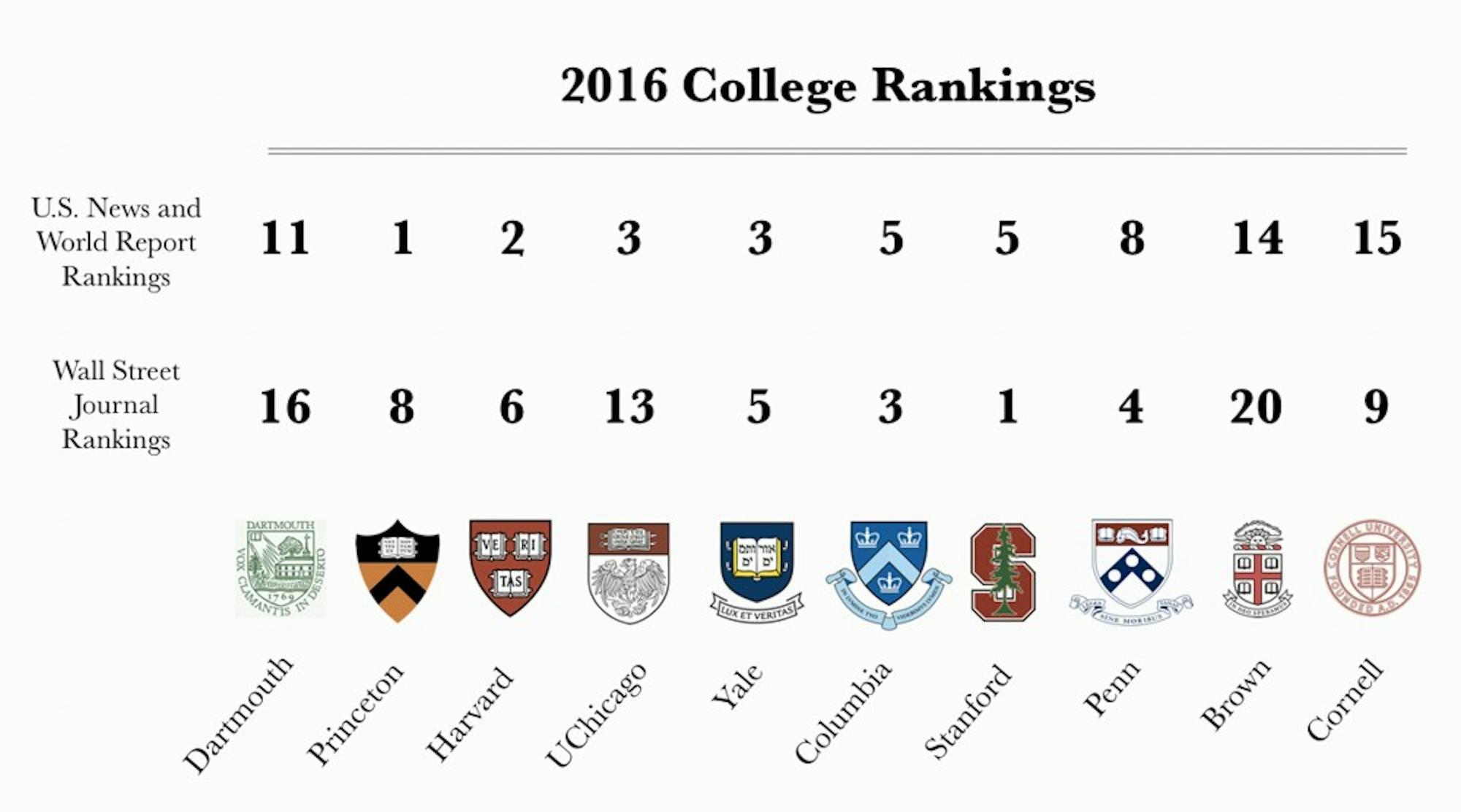For many prospective students and their families, traditional college rankings play a large role in the research and decision of where to apply and attend college. In a new ranking system that factors in student survey data and leaves out standardized test scores, Dartmouth ranked 16th.
The Wall Street Journal and Times Higher Education collaborated to release the new rankings, in which schools received an overall score out of 100 based on four categories. Student outcomes make up 40 percent of the overall score; school resources, 30 percent; engagement of the students, 20 percent; learning environment, 10 percent. The ranking system breaks these categories down further into more detailed factors, which include student to faculty ratio, academic spending per student, cost, salary 10 years after entrance and debt repayment three years after start of repayment. The rankings also include a student survey which asked current students to rate, out of 10, how strongly they feel their college was still the right choice, worth the cost and prepared them for their careers.
Stanford University, Massachusetts Institute of Technology and Columbia University received the highest overall scores of the 1,061 colleges surveyed. Princeton University and Harvard University, which have historically placed first or second in the U.S. News and World Report’s annual college rankings, ranked sixth and eighth in the WSJ/THE list, respectively.
Dartmouth received an overall score of 88.1 points, falling 3.9 points behind Stanford. Scores varied between many schools by as little as one-tenth of a point.
The WSJ/THE rankings evaluates student outcomes through graduation rates and a “value-for-money approach,” which includes salary 10 years after starting college and the ability to repay student debt. According to the Times Higher Education website, the data team determined the salary figures by projecting expected salaries and loan repayment timelines. The team then evaluated whether actual salary and debt repayment data aligned with these expectations. The outcomes metric also considers the academic reputation of the school, which is based on the Times Higher Education’s yearly Academic Reputation survey of “leading scholars.” For outcomes, Dartmouth’s score is 38.6 out of 40.
The resources category examines the amount of money each institution spends on teaching per student, the ratio of students-to-faculty members — which the rankings claim is an effective way of determining whether the college has enough faculty to teach and whether the student will receive individualized attention — and the number of research papers published per faculty member. In this category, Dartmouth scored 26.7 out of 30 points.
The engagement category, which draws on student survey results, attempts to evaluate teaching quality through Malcolm Gladwell’s definition of student engagement: “the extent to which students immerse themselves in the intellectual and social life of their college — and a major component of engagement is the quality of a student’s contacts with faculty.” Students answered 12 questions broken down into four categories: engagement with learning, interacting with others, whether the student would recommend the school to family members or friends and the number of subjects taught. Dartmouth received a 16.8 out of 20 on this engagement scale.
The final category, environment, examines the student body make-up and determines whether the environment is “diverse, supportive and inclusive.” This metric analyzes the percentage of international students, racial, ethnic and socioeconomic diversity of students and diversity of faculty. Dartmouth’s environment received a six out of 10.
Economics professor Bruce Sacerdote said the WSJ/THE data does not reveal the most important aspects of a college.
“The most honest thing [WSJ] can do is just put the data out there and let people come to their own conclusions, because a lot of the data in The Wall Street Journal, in particular, are squishy and from non-representative surveys that they conducted,” he said.
Dartmouth Alumni Council president Russell Wolff ’89 Tu ’94 said that rankings have never accurately reflected the way alumni feel about the College, and that current levels of alumni engagement are robust.
In the WSJ article “The Top U.S. Colleges,” Melissa Korn and Douglas Belkin wrote that their WSJ/THE system is distinct from other rankings because it incorporates survey results from 100,000 college students. In their press releases, the Journal also emphasized the lack of selectivity and SAT/ACT scores in their methodology, which are factors used in the U.S. News and World Report rankings.
WSJ editor-in-chief Gerard Baker wrote in his article “Why the WSJ/THE College Rankings Are Different – and Valuable,” that while selectivity matters a lot to some students, it does not determine measures of student engagement, teaching quality or future financial security. However, much like the WSJ/THE rankings, U.S. News also incorporates school resources and outcomes into their rankings, in which Dartmouth ranked 11th.
The WSJ/THE ranking data comes from the U.S. government through the Integrated Postsecondary Education Data System, College Scorecard and the U.S. Bureau of Economic Analysis, the Times Higher Education U.S. Student Survey, the Times Higher Education Academic Survey and the Elsevier bibliometric dataset. The rankings only included U.S. schools that are Title IV eligible, give graduates four-year bachelor’s degrees and have more than 1,000 students.
Alexandra is a ’20 from New York and is unsure of what she plans to study, but has interests in neuroscience, geography, and human-centered design. Alexandra has written for The D since her freshman fall, and she enjoys meeting people and learning about various groups on campus through her articles.




